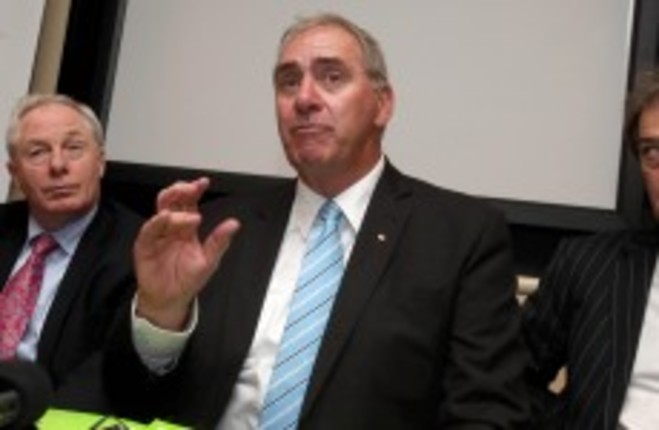GAA TEAMS AGAIN topped the list of missed drug tests in 2012, according to new figures published by the Irish Sports Council yesterday.
But Dr Una May, the director of anti-doping with the ISC, said that the issue is “not a huge concern” and that the GAA is committed to cutting the number.
Out of 12 unsuccessful team testing attempts last year, GAA teams were responsible for eight with the Football Association of Ireland (three) and the Irish Hockey Association (one) also on the list of offenders.
Last year, the ISC and the GAA agreed to fine counties as a deterrent following eight missed tests out of 17 in 2011. An unsuccessful test generally arises when teams are not training in the expected location.
“We have been taking it quite seriously and so have they,” May said at yesterday’s media briefing which was attended by John Fahey, the President of the World Anti-Doping Association, and WADA director-general David Howman.
“There are always going to be problems and we recognise particularly with the GAA because of the nature of the pitches that they play on and the facilities they have in some of the areas, they are significantly affected by weather conditions.
It’s not a huge concern but it is something that we do take seriously. We introduced that sanction of fining the county boards in cases where they have had missed tests and I think the fact that they’ve bought into that shows that they are taking it seriously as well.
In total, there were 787 tests carried out across 31 sports in 2012 with eight anti-doping rule violations: four for cannabis, which is a prohibited substance, and four for methylhexanamine, a substance found in supplements. Three positive tests occurred in tug-of-war, two in weightlifting and one apiece in motorsport, cycling and soccer.
There was also a non-analytical positive, Ireland’s first, which saw a boxing coach suspended for 27 months for providing a banned substance.
Overall the number of tests conducted was down on previous years, a decrease which was due to a more targeted programme and a 204% increase in blood testing. 133 blood tests were carried out in 2012, the ISC said.
“We are doing a very high level of blood testing and we’re doing very smart testing,” May said. “We don’t have the funds or the resources to do thousands or thousands of tests, but what we can do is we can be smart in what we do.
I think that’s the key thing coming out of today. We’ve started to be a lot smarter in what we do. We’re not just doing testing for the sake of testing. We’re targeting, we’re doing blood testing, and we’re doing blood testing for a number of different substances.
The Irish blood testing programme is “vigorous and comprehensive,” Fahey said. “I can’t say that with most other countries of the world, so thank you Ireland for recognising that if you’re not doing enough tests using blood as the sample, then you are likely to be missing [athletes].”
Both Fahey and Howman were in Dublin to meet the Minister for Transport, Tourism and Sport, Leo Varadkar TD, and Minister of State Michael Ring to discuss data protection legislation currently being considered by the European Union and its potentially negative impact on the fight against doping.
“There are some unintended consequences to sport from these particular laws if they go through in their current form,” Fahey said, “and I don’t believe anybody wants to impact adversely on sport.
I’m not criticising the legislation. I’m saying we have to ensure that when it finishes and is completed by the Parliament, it does not make it more difficult for us to fight those against who are cheating and fight against those who are doping. It could well have that consequence if minor changes aren’t made.There was certainly an understanding given that this will be looked at very seriously and that assistance will be given to the extent that Ireland can exercise its influence as the current President here in Europe.

